Importance of Small Businesses and Start-ups in UK's Social Economy
VerifiedAdded on 2022/12/27
|16
|4829
|1
AI Summary
This article discusses the importance of small businesses and start-ups in the progress of the UK's social economy. It highlights their role in providing employment, promoting innovation, and increasing the standard of living. The article also emphasizes the opportunities they create for women entrepreneurs and the competition they bring to the market.
Contribute Materials
Your contribution can guide someone’s learning journey. Share your
documents today.
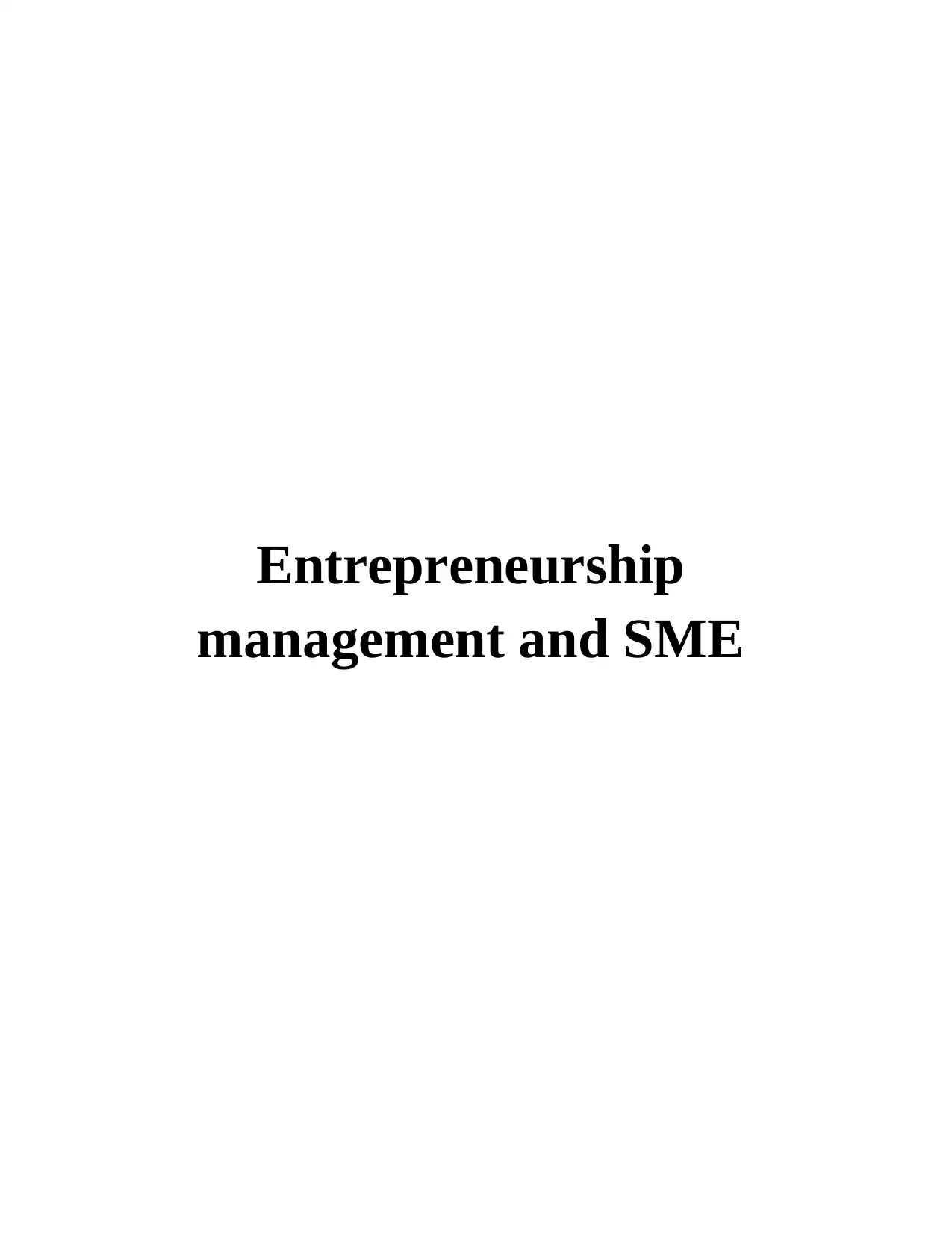
Entrepreneurship
management and SME
management and SME
Secure Best Marks with AI Grader
Need help grading? Try our AI Grader for instant feedback on your assignments.
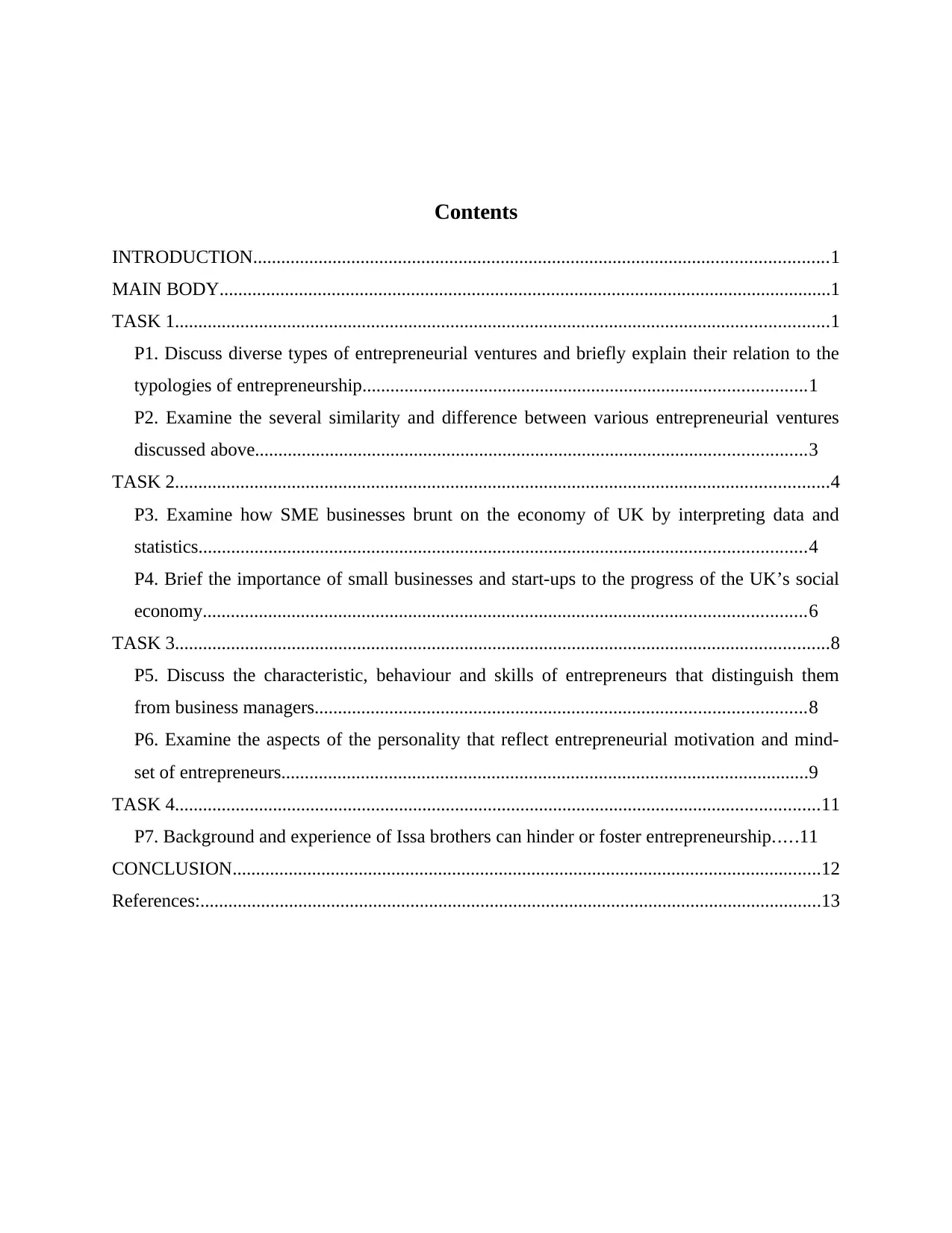
Contents
INTRODUCTION...........................................................................................................................1
MAIN BODY...................................................................................................................................1
TASK 1............................................................................................................................................1
P1. Discuss diverse types of entrepreneurial ventures and briefly explain their relation to the
typologies of entrepreneurship...............................................................................................1
P2. Examine the several similarity and difference between various entrepreneurial ventures
discussed above......................................................................................................................3
TASK 2............................................................................................................................................4
P3. Examine how SME businesses brunt on the economy of UK by interpreting data and
statistics..................................................................................................................................4
P4. Brief the importance of small businesses and start-ups to the progress of the UK’s social
economy.................................................................................................................................6
TASK 3............................................................................................................................................8
P5. Discuss the characteristic, behaviour and skills of entrepreneurs that distinguish them
from business managers.........................................................................................................8
P6. Examine the aspects of the personality that reflect entrepreneurial motivation and mind-
set of entrepreneurs.................................................................................................................9
TASK 4..........................................................................................................................................11
P7. Background and experience of Issa brothers can hinder or foster entrepreneurship.....11
CONCLUSION..............................................................................................................................12
References:.....................................................................................................................................13
INTRODUCTION...........................................................................................................................1
MAIN BODY...................................................................................................................................1
TASK 1............................................................................................................................................1
P1. Discuss diverse types of entrepreneurial ventures and briefly explain their relation to the
typologies of entrepreneurship...............................................................................................1
P2. Examine the several similarity and difference between various entrepreneurial ventures
discussed above......................................................................................................................3
TASK 2............................................................................................................................................4
P3. Examine how SME businesses brunt on the economy of UK by interpreting data and
statistics..................................................................................................................................4
P4. Brief the importance of small businesses and start-ups to the progress of the UK’s social
economy.................................................................................................................................6
TASK 3............................................................................................................................................8
P5. Discuss the characteristic, behaviour and skills of entrepreneurs that distinguish them
from business managers.........................................................................................................8
P6. Examine the aspects of the personality that reflect entrepreneurial motivation and mind-
set of entrepreneurs.................................................................................................................9
TASK 4..........................................................................................................................................11
P7. Background and experience of Issa brothers can hinder or foster entrepreneurship.....11
CONCLUSION..............................................................................................................................12
References:.....................................................................................................................................13
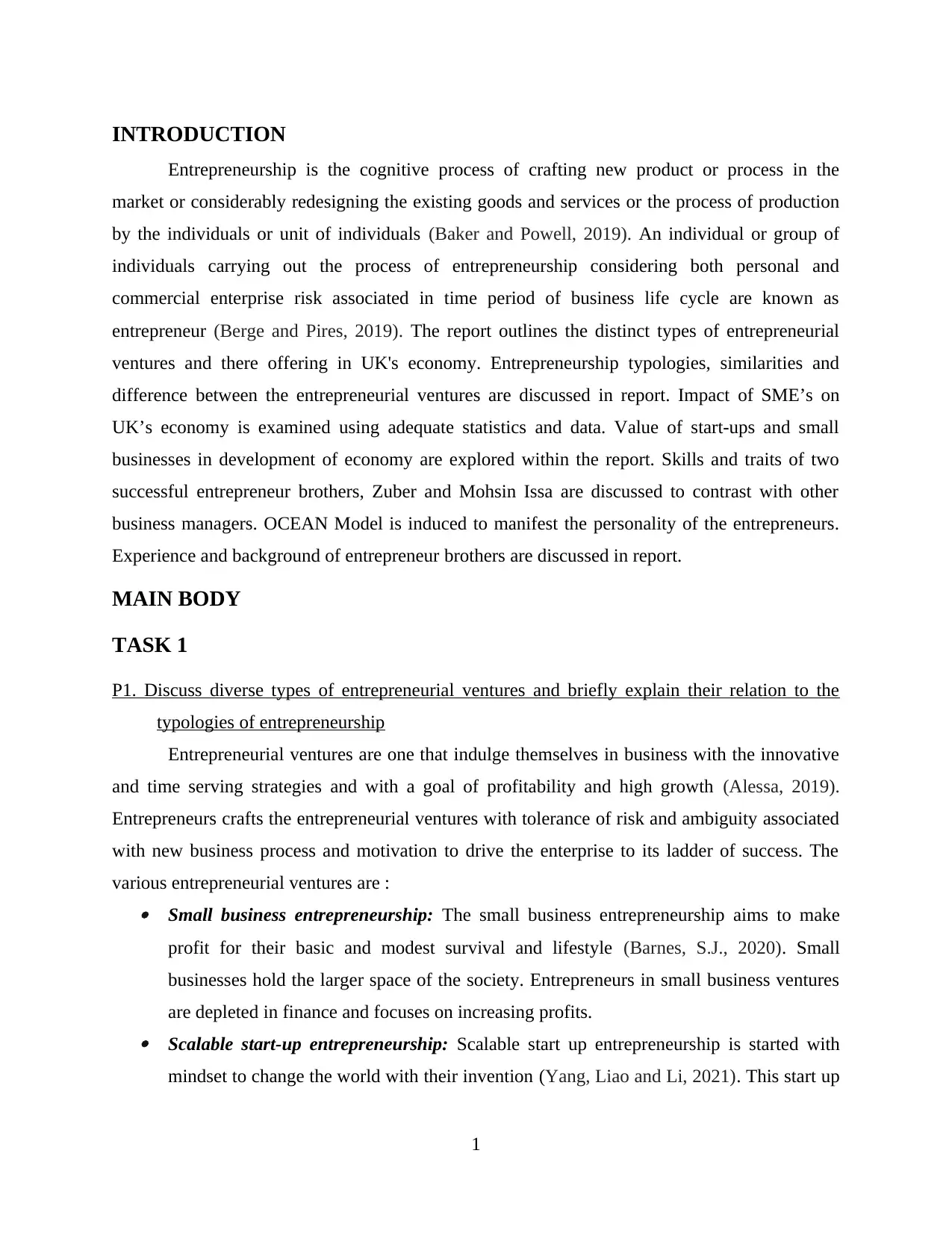
INTRODUCTION
Entrepreneurship is the cognitive process of crafting new product or process in the
market or considerably redesigning the existing goods and services or the process of production
by the individuals or unit of individuals (Baker and Powell, 2019). An individual or group of
individuals carrying out the process of entrepreneurship considering both personal and
commercial enterprise risk associated in time period of business life cycle are known as
entrepreneur (Berge and Pires, 2019). The report outlines the distinct types of entrepreneurial
ventures and there offering in UK's economy. Entrepreneurship typologies, similarities and
difference between the entrepreneurial ventures are discussed in report. Impact of SME’s on
UK’s economy is examined using adequate statistics and data. Value of start-ups and small
businesses in development of economy are explored within the report. Skills and traits of two
successful entrepreneur brothers, Zuber and Mohsin Issa are discussed to contrast with other
business managers. OCEAN Model is induced to manifest the personality of the entrepreneurs.
Experience and background of entrepreneur brothers are discussed in report.
MAIN BODY
TASK 1
P1. Discuss diverse types of entrepreneurial ventures and briefly explain their relation to the
typologies of entrepreneurship
Entrepreneurial ventures are one that indulge themselves in business with the innovative
and time serving strategies and with a goal of profitability and high growth (Alessa, 2019).
Entrepreneurs crafts the entrepreneurial ventures with tolerance of risk and ambiguity associated
with new business process and motivation to drive the enterprise to its ladder of success. The
various entrepreneurial ventures are : Small business entrepreneurship: The small business entrepreneurship aims to make
profit for their basic and modest survival and lifestyle (Barnes, S.J., 2020). Small
businesses hold the larger space of the society. Entrepreneurs in small business ventures
are depleted in finance and focuses on increasing profits. Scalable start-up entrepreneurship: Scalable start up entrepreneurship is started with
mindset to change the world with their invention (Yang, Liao and Li, 2021). This start up
1
Entrepreneurship is the cognitive process of crafting new product or process in the
market or considerably redesigning the existing goods and services or the process of production
by the individuals or unit of individuals (Baker and Powell, 2019). An individual or group of
individuals carrying out the process of entrepreneurship considering both personal and
commercial enterprise risk associated in time period of business life cycle are known as
entrepreneur (Berge and Pires, 2019). The report outlines the distinct types of entrepreneurial
ventures and there offering in UK's economy. Entrepreneurship typologies, similarities and
difference between the entrepreneurial ventures are discussed in report. Impact of SME’s on
UK’s economy is examined using adequate statistics and data. Value of start-ups and small
businesses in development of economy are explored within the report. Skills and traits of two
successful entrepreneur brothers, Zuber and Mohsin Issa are discussed to contrast with other
business managers. OCEAN Model is induced to manifest the personality of the entrepreneurs.
Experience and background of entrepreneur brothers are discussed in report.
MAIN BODY
TASK 1
P1. Discuss diverse types of entrepreneurial ventures and briefly explain their relation to the
typologies of entrepreneurship
Entrepreneurial ventures are one that indulge themselves in business with the innovative
and time serving strategies and with a goal of profitability and high growth (Alessa, 2019).
Entrepreneurs crafts the entrepreneurial ventures with tolerance of risk and ambiguity associated
with new business process and motivation to drive the enterprise to its ladder of success. The
various entrepreneurial ventures are : Small business entrepreneurship: The small business entrepreneurship aims to make
profit for their basic and modest survival and lifestyle (Barnes, S.J., 2020). Small
businesses hold the larger space of the society. Entrepreneurs in small business ventures
are depleted in finance and focuses on increasing profits. Scalable start-up entrepreneurship: Scalable start up entrepreneurship is started with
mindset to change the world with their invention (Yang, Liao and Li, 2021). This start up
1
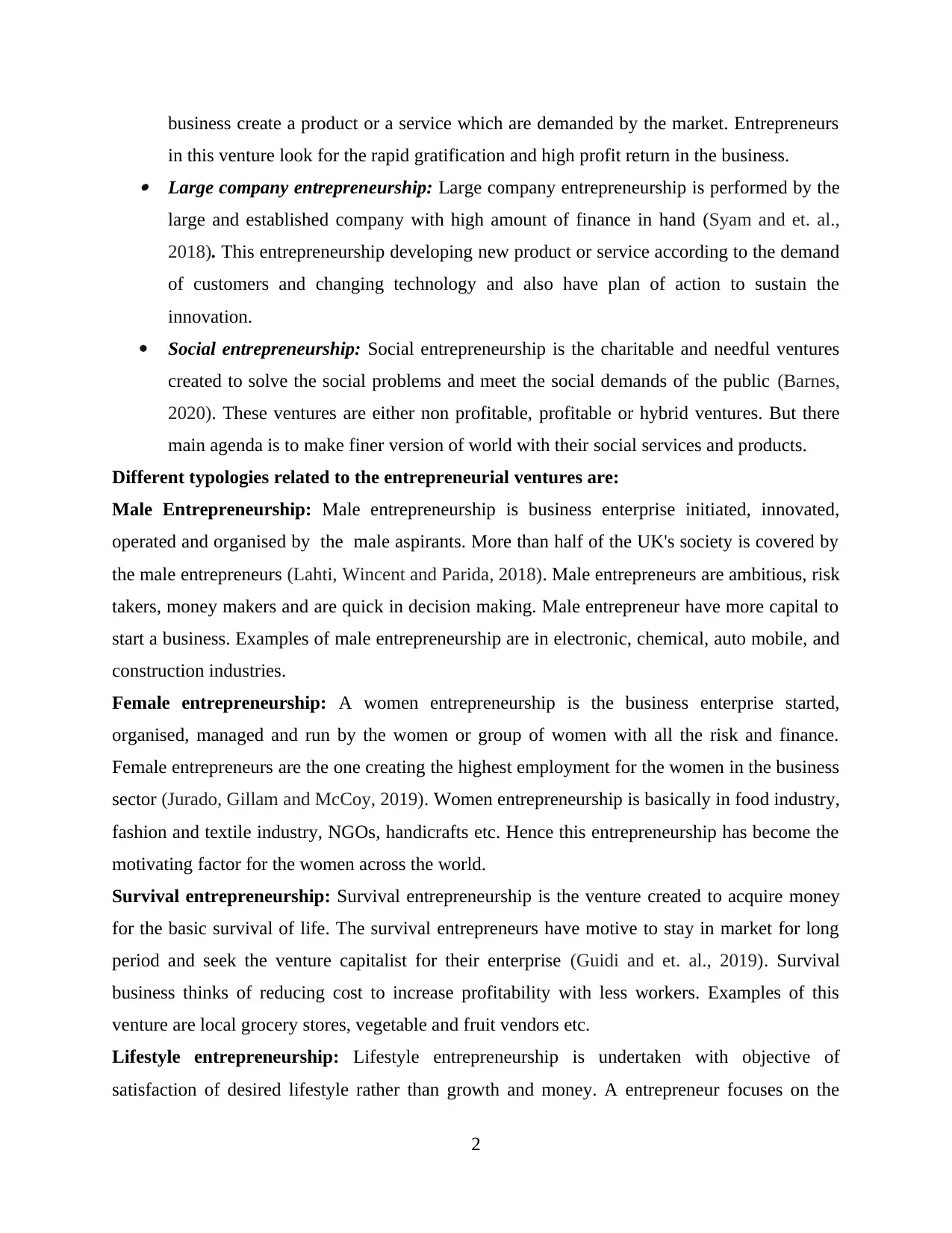
business create a product or a service which are demanded by the market. Entrepreneurs
in this venture look for the rapid gratification and high profit return in the business. Large company entrepreneurship: Large company entrepreneurship is performed by the
large and established company with high amount of finance in hand (Syam and et. al.,
2018). This entrepreneurship developing new product or service according to the demand
of customers and changing technology and also have plan of action to sustain the
innovation.
Social entrepreneurship: Social entrepreneurship is the charitable and needful ventures
created to solve the social problems and meet the social demands of the public (Barnes,
2020). These ventures are either non profitable, profitable or hybrid ventures. But there
main agenda is to make finer version of world with their social services and products.
Different typologies related to the entrepreneurial ventures are:
Male Entrepreneurship: Male entrepreneurship is business enterprise initiated, innovated,
operated and organised by the male aspirants. More than half of the UK's society is covered by
the male entrepreneurs (Lahti, Wincent and Parida, 2018). Male entrepreneurs are ambitious, risk
takers, money makers and are quick in decision making. Male entrepreneur have more capital to
start a business. Examples of male entrepreneurship are in electronic, chemical, auto mobile, and
construction industries.
Female entrepreneurship: A women entrepreneurship is the business enterprise started,
organised, managed and run by the women or group of women with all the risk and finance.
Female entrepreneurs are the one creating the highest employment for the women in the business
sector (Jurado, Gillam and McCoy, 2019). Women entrepreneurship is basically in food industry,
fashion and textile industry, NGOs, handicrafts etc. Hence this entrepreneurship has become the
motivating factor for the women across the world.
Survival entrepreneurship: Survival entrepreneurship is the venture created to acquire money
for the basic survival of life. The survival entrepreneurs have motive to stay in market for long
period and seek the venture capitalist for their enterprise (Guidi and et. al., 2019). Survival
business thinks of reducing cost to increase profitability with less workers. Examples of this
venture are local grocery stores, vegetable and fruit vendors etc.
Lifestyle entrepreneurship: Lifestyle entrepreneurship is undertaken with objective of
satisfaction of desired lifestyle rather than growth and money. A entrepreneur focuses on the
2
in this venture look for the rapid gratification and high profit return in the business. Large company entrepreneurship: Large company entrepreneurship is performed by the
large and established company with high amount of finance in hand (Syam and et. al.,
2018). This entrepreneurship developing new product or service according to the demand
of customers and changing technology and also have plan of action to sustain the
innovation.
Social entrepreneurship: Social entrepreneurship is the charitable and needful ventures
created to solve the social problems and meet the social demands of the public (Barnes,
2020). These ventures are either non profitable, profitable or hybrid ventures. But there
main agenda is to make finer version of world with their social services and products.
Different typologies related to the entrepreneurial ventures are:
Male Entrepreneurship: Male entrepreneurship is business enterprise initiated, innovated,
operated and organised by the male aspirants. More than half of the UK's society is covered by
the male entrepreneurs (Lahti, Wincent and Parida, 2018). Male entrepreneurs are ambitious, risk
takers, money makers and are quick in decision making. Male entrepreneur have more capital to
start a business. Examples of male entrepreneurship are in electronic, chemical, auto mobile, and
construction industries.
Female entrepreneurship: A women entrepreneurship is the business enterprise started,
organised, managed and run by the women or group of women with all the risk and finance.
Female entrepreneurs are the one creating the highest employment for the women in the business
sector (Jurado, Gillam and McCoy, 2019). Women entrepreneurship is basically in food industry,
fashion and textile industry, NGOs, handicrafts etc. Hence this entrepreneurship has become the
motivating factor for the women across the world.
Survival entrepreneurship: Survival entrepreneurship is the venture created to acquire money
for the basic survival of life. The survival entrepreneurs have motive to stay in market for long
period and seek the venture capitalist for their enterprise (Guidi and et. al., 2019). Survival
business thinks of reducing cost to increase profitability with less workers. Examples of this
venture are local grocery stores, vegetable and fruit vendors etc.
Lifestyle entrepreneurship: Lifestyle entrepreneurship is undertaken with objective of
satisfaction of desired lifestyle rather than growth and money. A entrepreneur focuses on the
2
Secure Best Marks with AI Grader
Need help grading? Try our AI Grader for instant feedback on your assignments.
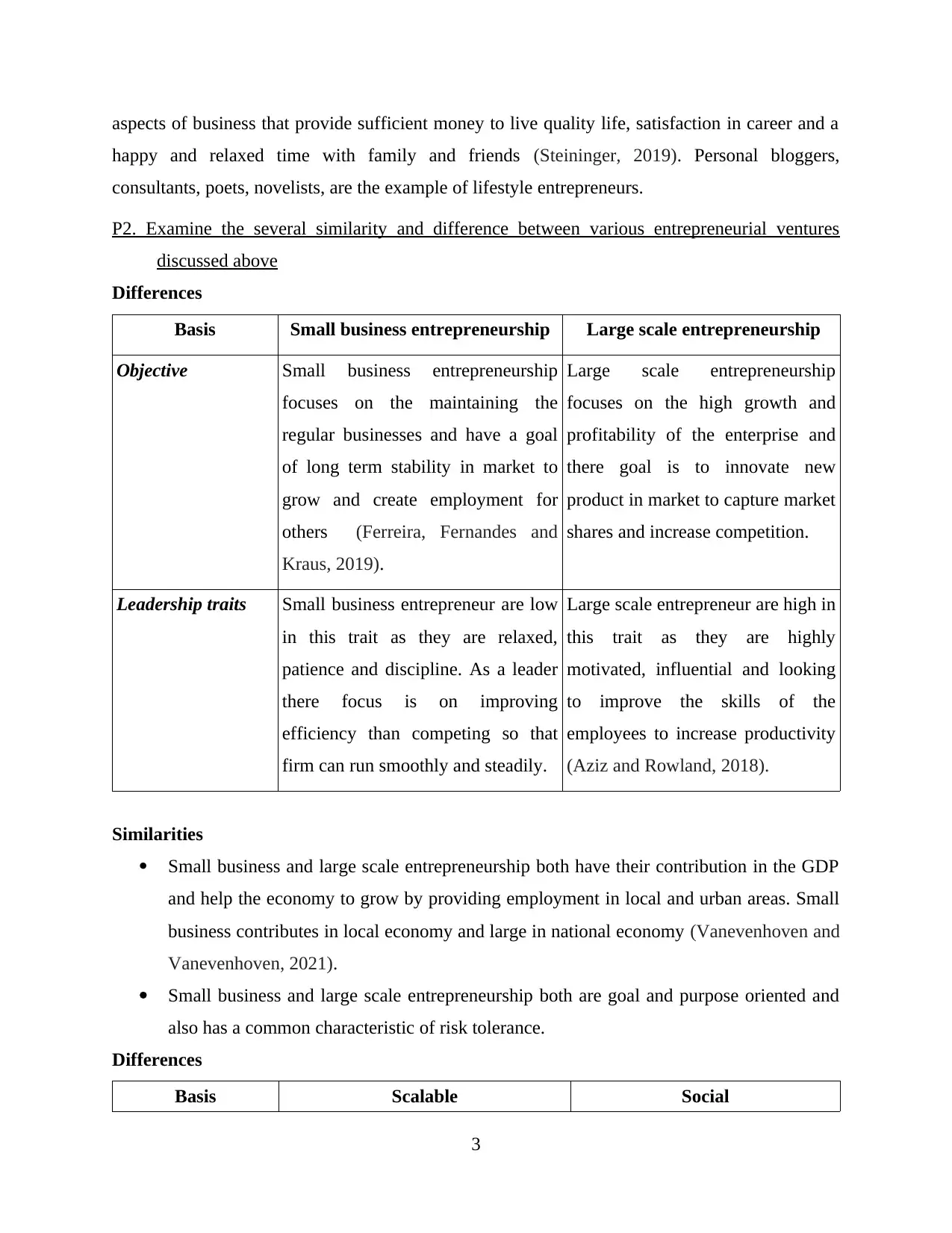
aspects of business that provide sufficient money to live quality life, satisfaction in career and a
happy and relaxed time with family and friends (Steininger, 2019). Personal bloggers,
consultants, poets, novelists, are the example of lifestyle entrepreneurs.
P2. Examine the several similarity and difference between various entrepreneurial ventures
discussed above
Differences
Basis Small business entrepreneurship Large scale entrepreneurship
Objective Small business entrepreneurship
focuses on the maintaining the
regular businesses and have a goal
of long term stability in market to
grow and create employment for
others (Ferreira, Fernandes and
Kraus, 2019).
Large scale entrepreneurship
focuses on the high growth and
profitability of the enterprise and
there goal is to innovate new
product in market to capture market
shares and increase competition.
Leadership traits Small business entrepreneur are low
in this trait as they are relaxed,
patience and discipline. As a leader
there focus is on improving
efficiency than competing so that
firm can run smoothly and steadily.
Large scale entrepreneur are high in
this trait as they are highly
motivated, influential and looking
to improve the skills of the
employees to increase productivity
(Aziz and Rowland, 2018).
Similarities
Small business and large scale entrepreneurship both have their contribution in the GDP
and help the economy to grow by providing employment in local and urban areas. Small
business contributes in local economy and large in national economy (Vanevenhoven and
Vanevenhoven, 2021).
Small business and large scale entrepreneurship both are goal and purpose oriented and
also has a common characteristic of risk tolerance.
Differences
Basis Scalable Social
3
happy and relaxed time with family and friends (Steininger, 2019). Personal bloggers,
consultants, poets, novelists, are the example of lifestyle entrepreneurs.
P2. Examine the several similarity and difference between various entrepreneurial ventures
discussed above
Differences
Basis Small business entrepreneurship Large scale entrepreneurship
Objective Small business entrepreneurship
focuses on the maintaining the
regular businesses and have a goal
of long term stability in market to
grow and create employment for
others (Ferreira, Fernandes and
Kraus, 2019).
Large scale entrepreneurship
focuses on the high growth and
profitability of the enterprise and
there goal is to innovate new
product in market to capture market
shares and increase competition.
Leadership traits Small business entrepreneur are low
in this trait as they are relaxed,
patience and discipline. As a leader
there focus is on improving
efficiency than competing so that
firm can run smoothly and steadily.
Large scale entrepreneur are high in
this trait as they are highly
motivated, influential and looking
to improve the skills of the
employees to increase productivity
(Aziz and Rowland, 2018).
Similarities
Small business and large scale entrepreneurship both have their contribution in the GDP
and help the economy to grow by providing employment in local and urban areas. Small
business contributes in local economy and large in national economy (Vanevenhoven and
Vanevenhoven, 2021).
Small business and large scale entrepreneurship both are goal and purpose oriented and
also has a common characteristic of risk tolerance.
Differences
Basis Scalable Social
3
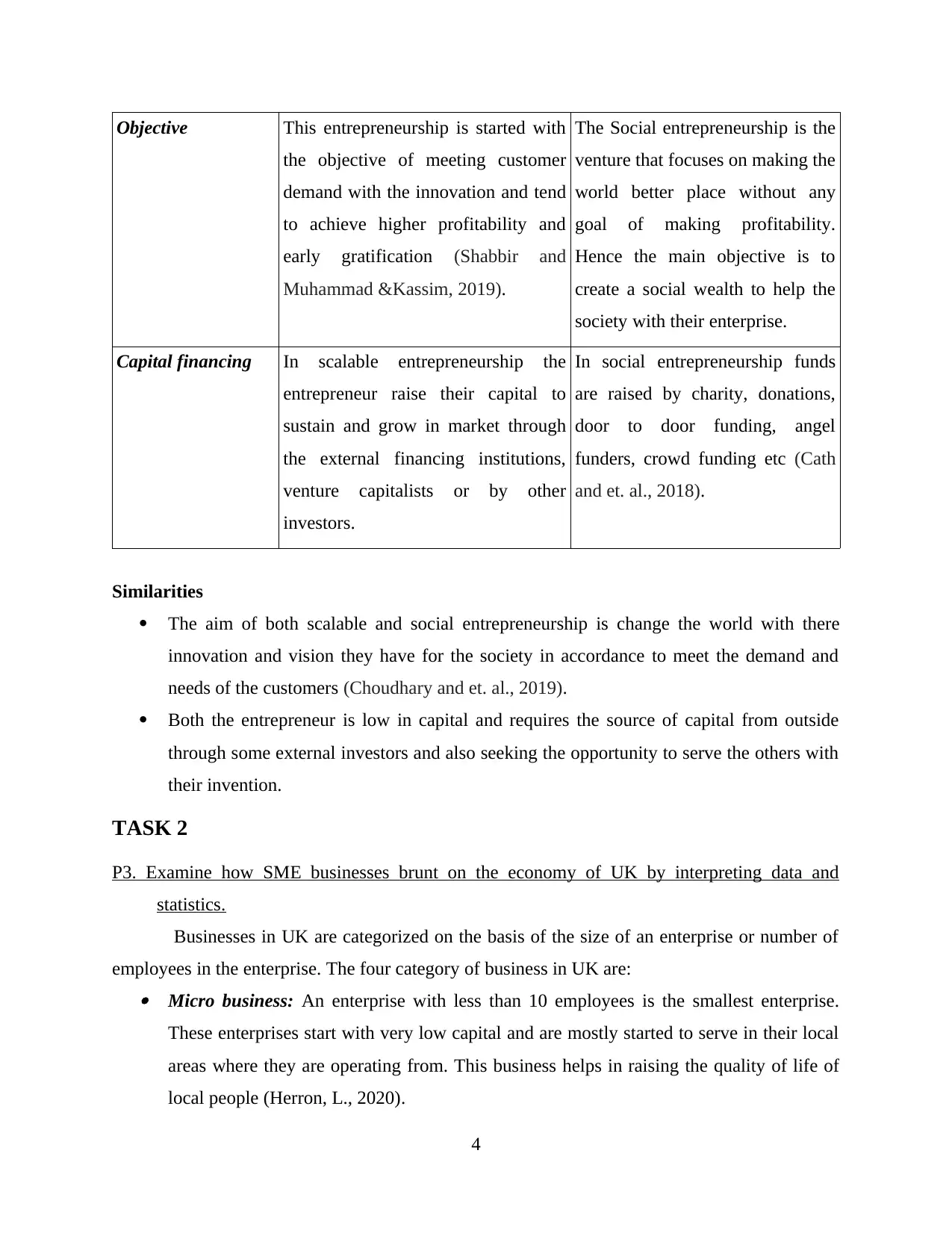
Objective This entrepreneurship is started with
the objective of meeting customer
demand with the innovation and tend
to achieve higher profitability and
early gratification (Shabbir and
Muhammad &Kassim, 2019).
The Social entrepreneurship is the
venture that focuses on making the
world better place without any
goal of making profitability.
Hence the main objective is to
create a social wealth to help the
society with their enterprise.
Capital financing In scalable entrepreneurship the
entrepreneur raise their capital to
sustain and grow in market through
the external financing institutions,
venture capitalists or by other
investors.
In social entrepreneurship funds
are raised by charity, donations,
door to door funding, angel
funders, crowd funding etc (Cath
and et. al., 2018).
Similarities
The aim of both scalable and social entrepreneurship is change the world with there
innovation and vision they have for the society in accordance to meet the demand and
needs of the customers (Choudhary and et. al., 2019).
Both the entrepreneur is low in capital and requires the source of capital from outside
through some external investors and also seeking the opportunity to serve the others with
their invention.
TASK 2
P3. Examine how SME businesses brunt on the economy of UK by interpreting data and
statistics.
Businesses in UK are categorized on the basis of the size of an enterprise or number of
employees in the enterprise. The four category of business in UK are: Micro business: An enterprise with less than 10 employees is the smallest enterprise.
These enterprises start with very low capital and are mostly started to serve in their local
areas where they are operating from. This business helps in raising the quality of life of
local people (Herron, L., 2020).
4
the objective of meeting customer
demand with the innovation and tend
to achieve higher profitability and
early gratification (Shabbir and
Muhammad &Kassim, 2019).
The Social entrepreneurship is the
venture that focuses on making the
world better place without any
goal of making profitability.
Hence the main objective is to
create a social wealth to help the
society with their enterprise.
Capital financing In scalable entrepreneurship the
entrepreneur raise their capital to
sustain and grow in market through
the external financing institutions,
venture capitalists or by other
investors.
In social entrepreneurship funds
are raised by charity, donations,
door to door funding, angel
funders, crowd funding etc (Cath
and et. al., 2018).
Similarities
The aim of both scalable and social entrepreneurship is change the world with there
innovation and vision they have for the society in accordance to meet the demand and
needs of the customers (Choudhary and et. al., 2019).
Both the entrepreneur is low in capital and requires the source of capital from outside
through some external investors and also seeking the opportunity to serve the others with
their invention.
TASK 2
P3. Examine how SME businesses brunt on the economy of UK by interpreting data and
statistics.
Businesses in UK are categorized on the basis of the size of an enterprise or number of
employees in the enterprise. The four category of business in UK are: Micro business: An enterprise with less than 10 employees is the smallest enterprise.
These enterprises start with very low capital and are mostly started to serve in their local
areas where they are operating from. This business helps in raising the quality of life of
local people (Herron, L., 2020).
4
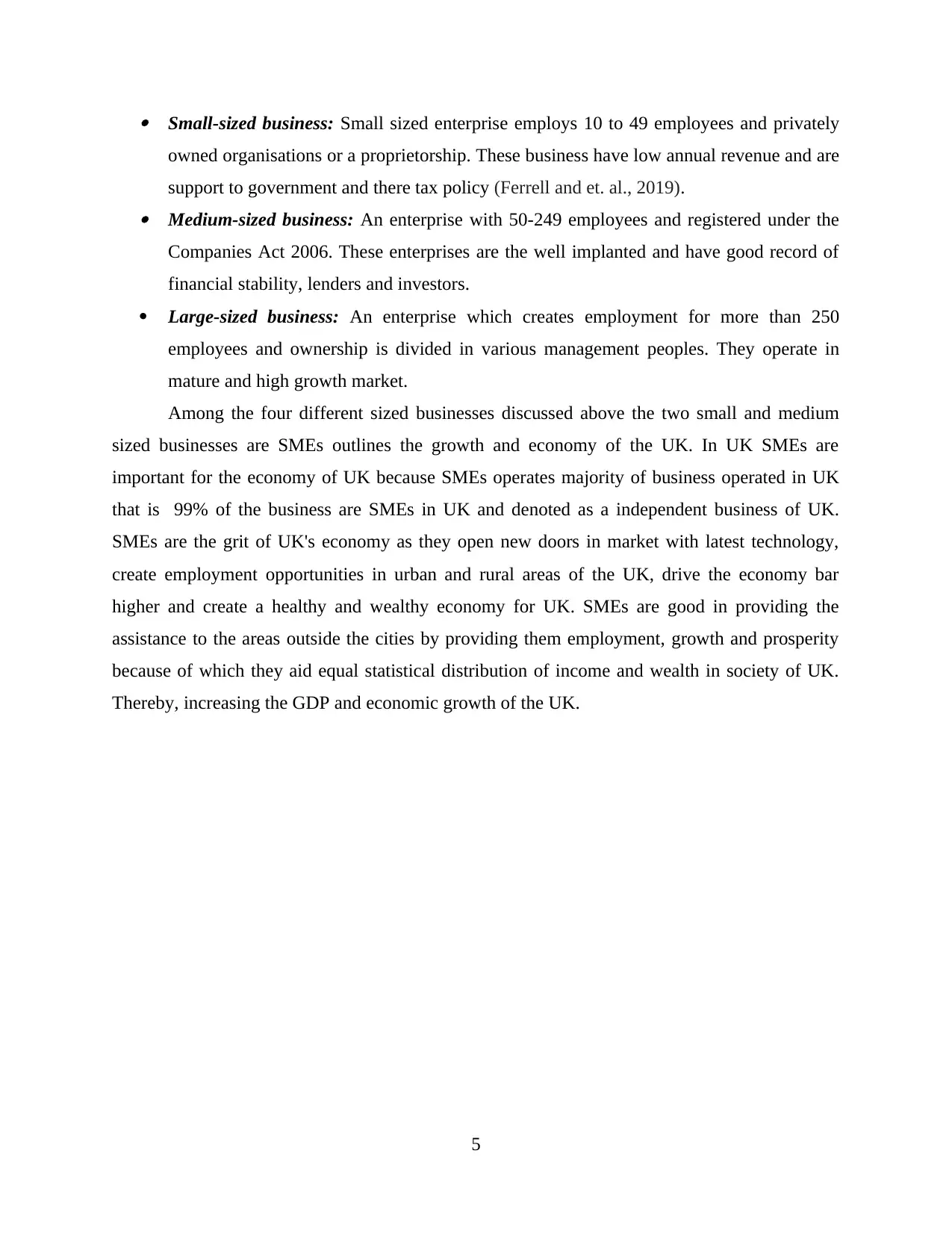
Small-sized business: Small sized enterprise employs 10 to 49 employees and privately
owned organisations or a proprietorship. These business have low annual revenue and are
support to government and there tax policy (Ferrell and et. al., 2019). Medium-sized business: An enterprise with 50-249 employees and registered under the
Companies Act 2006. These enterprises are the well implanted and have good record of
financial stability, lenders and investors.
Large-sized business: An enterprise which creates employment for more than 250
employees and ownership is divided in various management peoples. They operate in
mature and high growth market.
Among the four different sized businesses discussed above the two small and medium
sized businesses are SMEs outlines the growth and economy of the UK. In UK SMEs are
important for the economy of UK because SMEs operates majority of business operated in UK
that is 99% of the business are SMEs in UK and denoted as a independent business of UK.
SMEs are the grit of UK's economy as they open new doors in market with latest technology,
create employment opportunities in urban and rural areas of the UK, drive the economy bar
higher and create a healthy and wealthy economy for UK. SMEs are good in providing the
assistance to the areas outside the cities by providing them employment, growth and prosperity
because of which they aid equal statistical distribution of income and wealth in society of UK.
Thereby, increasing the GDP and economic growth of the UK.
5
owned organisations or a proprietorship. These business have low annual revenue and are
support to government and there tax policy (Ferrell and et. al., 2019). Medium-sized business: An enterprise with 50-249 employees and registered under the
Companies Act 2006. These enterprises are the well implanted and have good record of
financial stability, lenders and investors.
Large-sized business: An enterprise which creates employment for more than 250
employees and ownership is divided in various management peoples. They operate in
mature and high growth market.
Among the four different sized businesses discussed above the two small and medium
sized businesses are SMEs outlines the growth and economy of the UK. In UK SMEs are
important for the economy of UK because SMEs operates majority of business operated in UK
that is 99% of the business are SMEs in UK and denoted as a independent business of UK.
SMEs are the grit of UK's economy as they open new doors in market with latest technology,
create employment opportunities in urban and rural areas of the UK, drive the economy bar
higher and create a healthy and wealthy economy for UK. SMEs are good in providing the
assistance to the areas outside the cities by providing them employment, growth and prosperity
because of which they aid equal statistical distribution of income and wealth in society of UK.
Thereby, increasing the GDP and economic growth of the UK.
5
Paraphrase This Document
Need a fresh take? Get an instant paraphrase of this document with our AI Paraphraser
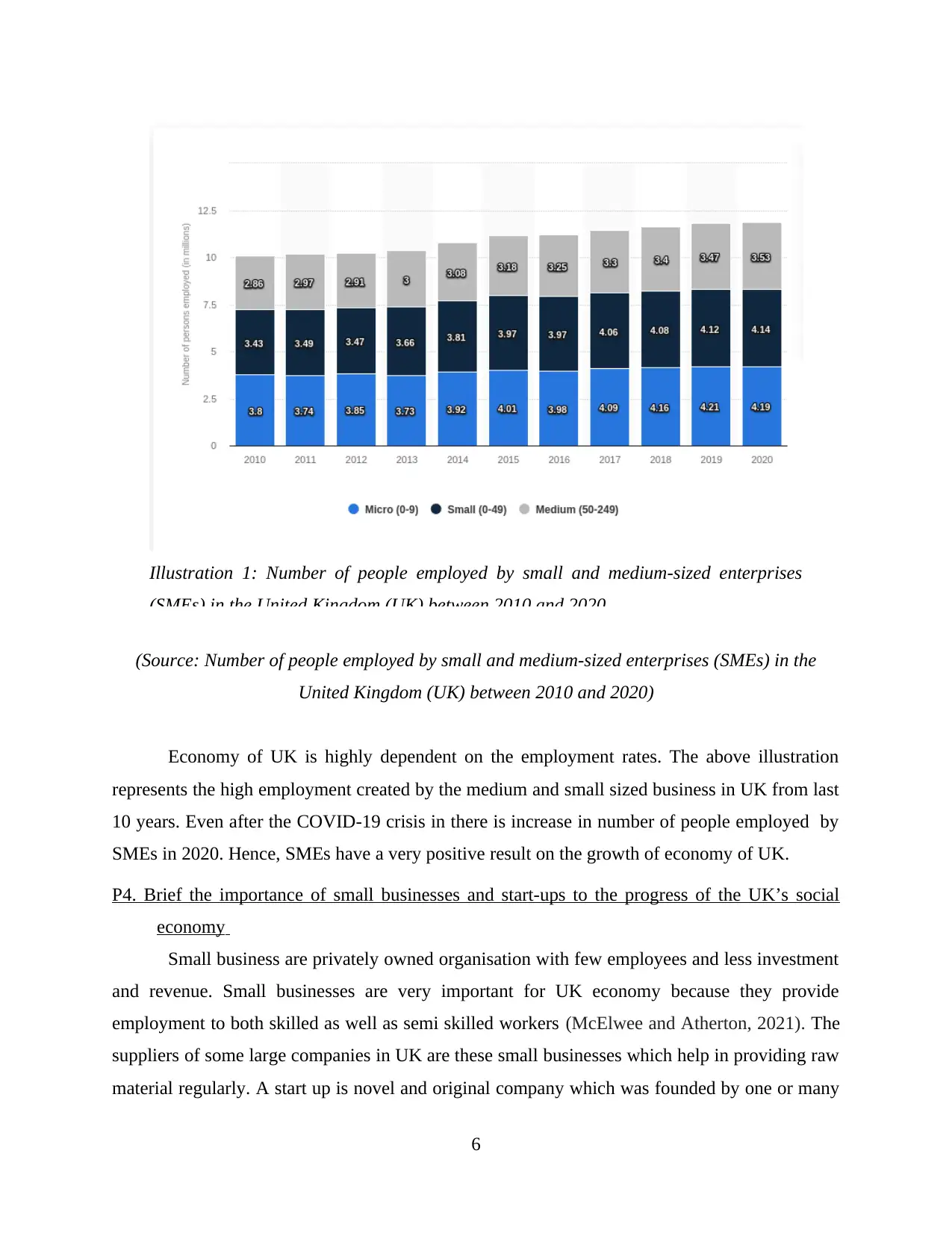
(Source: Number of people employed by small and medium-sized enterprises (SMEs) in the
United Kingdom (UK) between 2010 and 2020)
Economy of UK is highly dependent on the employment rates. The above illustration
represents the high employment created by the medium and small sized business in UK from last
10 years. Even after the COVID-19 crisis in there is increase in number of people employed by
SMEs in 2020. Hence, SMEs have a very positive result on the growth of economy of UK.
P4. Brief the importance of small businesses and start-ups to the progress of the UK’s social
economy
Small business are privately owned organisation with few employees and less investment
and revenue. Small businesses are very important for UK economy because they provide
employment to both skilled as well as semi skilled workers (McElwee and Atherton, 2021). The
suppliers of some large companies in UK are these small businesses which help in providing raw
material regularly. A start up is novel and original company which was founded by one or many
6
Illustration 1: Number of people employed by small and medium-sized enterprises
(SMEs) in the United Kingdom (UK) between 2010 and 2020
United Kingdom (UK) between 2010 and 2020)
Economy of UK is highly dependent on the employment rates. The above illustration
represents the high employment created by the medium and small sized business in UK from last
10 years. Even after the COVID-19 crisis in there is increase in number of people employed by
SMEs in 2020. Hence, SMEs have a very positive result on the growth of economy of UK.
P4. Brief the importance of small businesses and start-ups to the progress of the UK’s social
economy
Small business are privately owned organisation with few employees and less investment
and revenue. Small businesses are very important for UK economy because they provide
employment to both skilled as well as semi skilled workers (McElwee and Atherton, 2021). The
suppliers of some large companies in UK are these small businesses which help in providing raw
material regularly. A start up is novel and original company which was founded by one or many
6
Illustration 1: Number of people employed by small and medium-sized enterprises
(SMEs) in the United Kingdom (UK) between 2010 and 2020
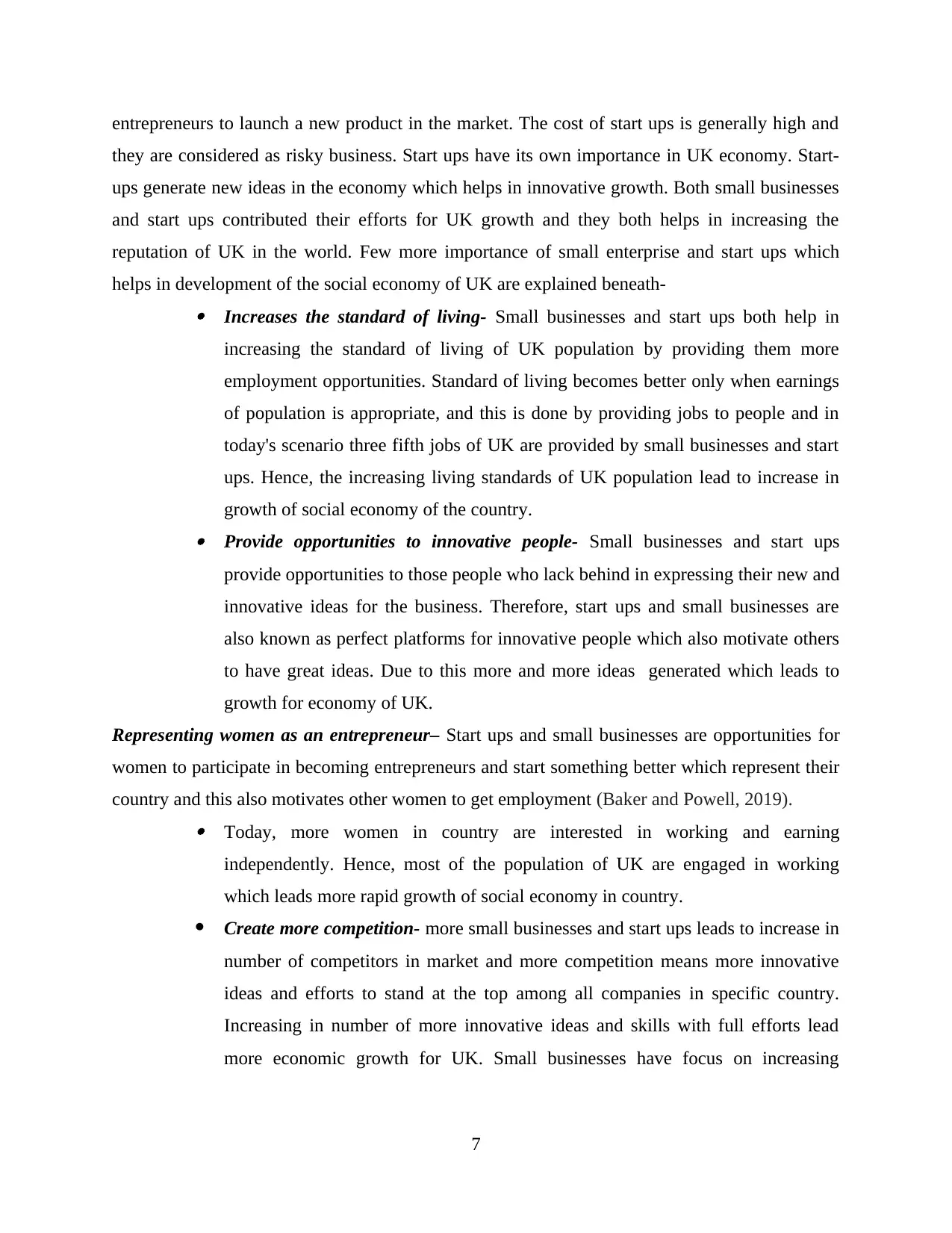
entrepreneurs to launch a new product in the market. The cost of start ups is generally high and
they are considered as risky business. Start ups have its own importance in UK economy. Start-
ups generate new ideas in the economy which helps in innovative growth. Both small businesses
and start ups contributed their efforts for UK growth and they both helps in increasing the
reputation of UK in the world. Few more importance of small enterprise and start ups which
helps in development of the social economy of UK are explained beneath-
Increases the standard of living- Small businesses and start ups both help in
increasing the standard of living of UK population by providing them more
employment opportunities. Standard of living becomes better only when earnings
of population is appropriate, and this is done by providing jobs to people and in
today's scenario three fifth jobs of UK are provided by small businesses and start
ups. Hence, the increasing living standards of UK population lead to increase in
growth of social economy of the country.
Provide opportunities to innovative people- Small businesses and start ups
provide opportunities to those people who lack behind in expressing their new and
innovative ideas for the business. Therefore, start ups and small businesses are
also known as perfect platforms for innovative people which also motivate others
to have great ideas. Due to this more and more ideas generated which leads to
growth for economy of UK.
Representing women as an entrepreneur– Start ups and small businesses are opportunities for
women to participate in becoming entrepreneurs and start something better which represent their
country and this also motivates other women to get employment (Baker and Powell, 2019).
Today, more women in country are interested in working and earning
independently. Hence, most of the population of UK are engaged in working
which leads more rapid growth of social economy in country.
Create more competition- more small businesses and start ups leads to increase in
number of competitors in market and more competition means more innovative
ideas and efforts to stand at the top among all companies in specific country.
Increasing in number of more innovative ideas and skills with full efforts lead
more economic growth for UK. Small businesses have focus on increasing
7
they are considered as risky business. Start ups have its own importance in UK economy. Start-
ups generate new ideas in the economy which helps in innovative growth. Both small businesses
and start ups contributed their efforts for UK growth and they both helps in increasing the
reputation of UK in the world. Few more importance of small enterprise and start ups which
helps in development of the social economy of UK are explained beneath-
Increases the standard of living- Small businesses and start ups both help in
increasing the standard of living of UK population by providing them more
employment opportunities. Standard of living becomes better only when earnings
of population is appropriate, and this is done by providing jobs to people and in
today's scenario three fifth jobs of UK are provided by small businesses and start
ups. Hence, the increasing living standards of UK population lead to increase in
growth of social economy of the country.
Provide opportunities to innovative people- Small businesses and start ups
provide opportunities to those people who lack behind in expressing their new and
innovative ideas for the business. Therefore, start ups and small businesses are
also known as perfect platforms for innovative people which also motivate others
to have great ideas. Due to this more and more ideas generated which leads to
growth for economy of UK.
Representing women as an entrepreneur– Start ups and small businesses are opportunities for
women to participate in becoming entrepreneurs and start something better which represent their
country and this also motivates other women to get employment (Baker and Powell, 2019).
Today, more women in country are interested in working and earning
independently. Hence, most of the population of UK are engaged in working
which leads more rapid growth of social economy in country.
Create more competition- more small businesses and start ups leads to increase in
number of competitors in market and more competition means more innovative
ideas and efforts to stand at the top among all companies in specific country.
Increasing in number of more innovative ideas and skills with full efforts lead
more economic growth for UK. Small businesses have focus on increasing
7
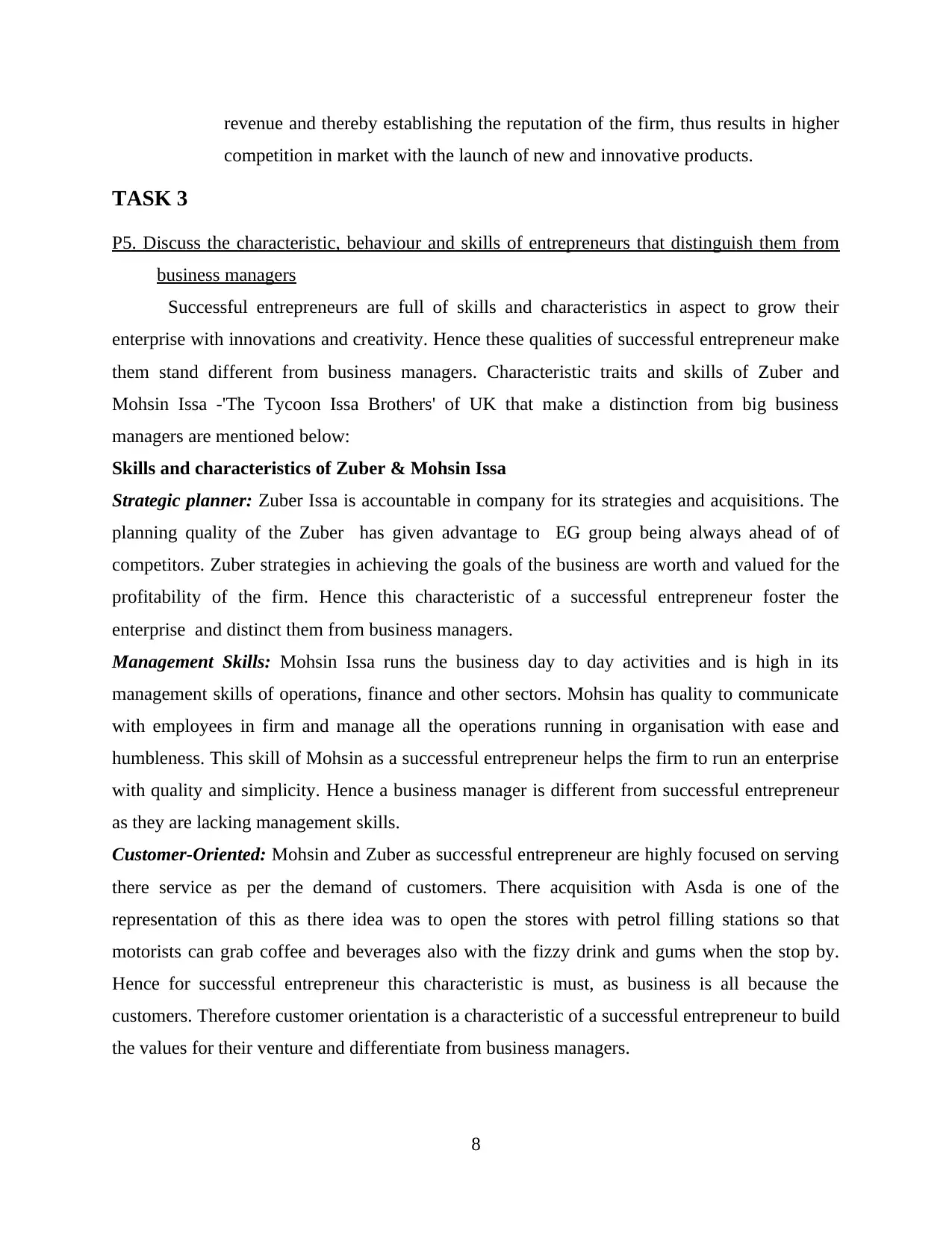
revenue and thereby establishing the reputation of the firm, thus results in higher
competition in market with the launch of new and innovative products.
TASK 3
P5. Discuss the characteristic, behaviour and skills of entrepreneurs that distinguish them from
business managers
Successful entrepreneurs are full of skills and characteristics in aspect to grow their
enterprise with innovations and creativity. Hence these qualities of successful entrepreneur make
them stand different from business managers. Characteristic traits and skills of Zuber and
Mohsin Issa -'The Tycoon Issa Brothers' of UK that make a distinction from big business
managers are mentioned below:
Skills and characteristics of Zuber & Mohsin Issa
Strategic planner: Zuber Issa is accountable in company for its strategies and acquisitions. The
planning quality of the Zuber has given advantage to EG group being always ahead of of
competitors. Zuber strategies in achieving the goals of the business are worth and valued for the
profitability of the firm. Hence this characteristic of a successful entrepreneur foster the
enterprise and distinct them from business managers.
Management Skills: Mohsin Issa runs the business day to day activities and is high in its
management skills of operations, finance and other sectors. Mohsin has quality to communicate
with employees in firm and manage all the operations running in organisation with ease and
humbleness. This skill of Mohsin as a successful entrepreneur helps the firm to run an enterprise
with quality and simplicity. Hence a business manager is different from successful entrepreneur
as they are lacking management skills.
Customer-Oriented: Mohsin and Zuber as successful entrepreneur are highly focused on serving
there service as per the demand of customers. There acquisition with Asda is one of the
representation of this as there idea was to open the stores with petrol filling stations so that
motorists can grab coffee and beverages also with the fizzy drink and gums when the stop by.
Hence for successful entrepreneur this characteristic is must, as business is all because the
customers. Therefore customer orientation is a characteristic of a successful entrepreneur to build
the values for their venture and differentiate from business managers.
8
competition in market with the launch of new and innovative products.
TASK 3
P5. Discuss the characteristic, behaviour and skills of entrepreneurs that distinguish them from
business managers
Successful entrepreneurs are full of skills and characteristics in aspect to grow their
enterprise with innovations and creativity. Hence these qualities of successful entrepreneur make
them stand different from business managers. Characteristic traits and skills of Zuber and
Mohsin Issa -'The Tycoon Issa Brothers' of UK that make a distinction from big business
managers are mentioned below:
Skills and characteristics of Zuber & Mohsin Issa
Strategic planner: Zuber Issa is accountable in company for its strategies and acquisitions. The
planning quality of the Zuber has given advantage to EG group being always ahead of of
competitors. Zuber strategies in achieving the goals of the business are worth and valued for the
profitability of the firm. Hence this characteristic of a successful entrepreneur foster the
enterprise and distinct them from business managers.
Management Skills: Mohsin Issa runs the business day to day activities and is high in its
management skills of operations, finance and other sectors. Mohsin has quality to communicate
with employees in firm and manage all the operations running in organisation with ease and
humbleness. This skill of Mohsin as a successful entrepreneur helps the firm to run an enterprise
with quality and simplicity. Hence a business manager is different from successful entrepreneur
as they are lacking management skills.
Customer-Oriented: Mohsin and Zuber as successful entrepreneur are highly focused on serving
there service as per the demand of customers. There acquisition with Asda is one of the
representation of this as there idea was to open the stores with petrol filling stations so that
motorists can grab coffee and beverages also with the fizzy drink and gums when the stop by.
Hence for successful entrepreneur this characteristic is must, as business is all because the
customers. Therefore customer orientation is a characteristic of a successful entrepreneur to build
the values for their venture and differentiate from business managers.
8
Secure Best Marks with AI Grader
Need help grading? Try our AI Grader for instant feedback on your assignments.
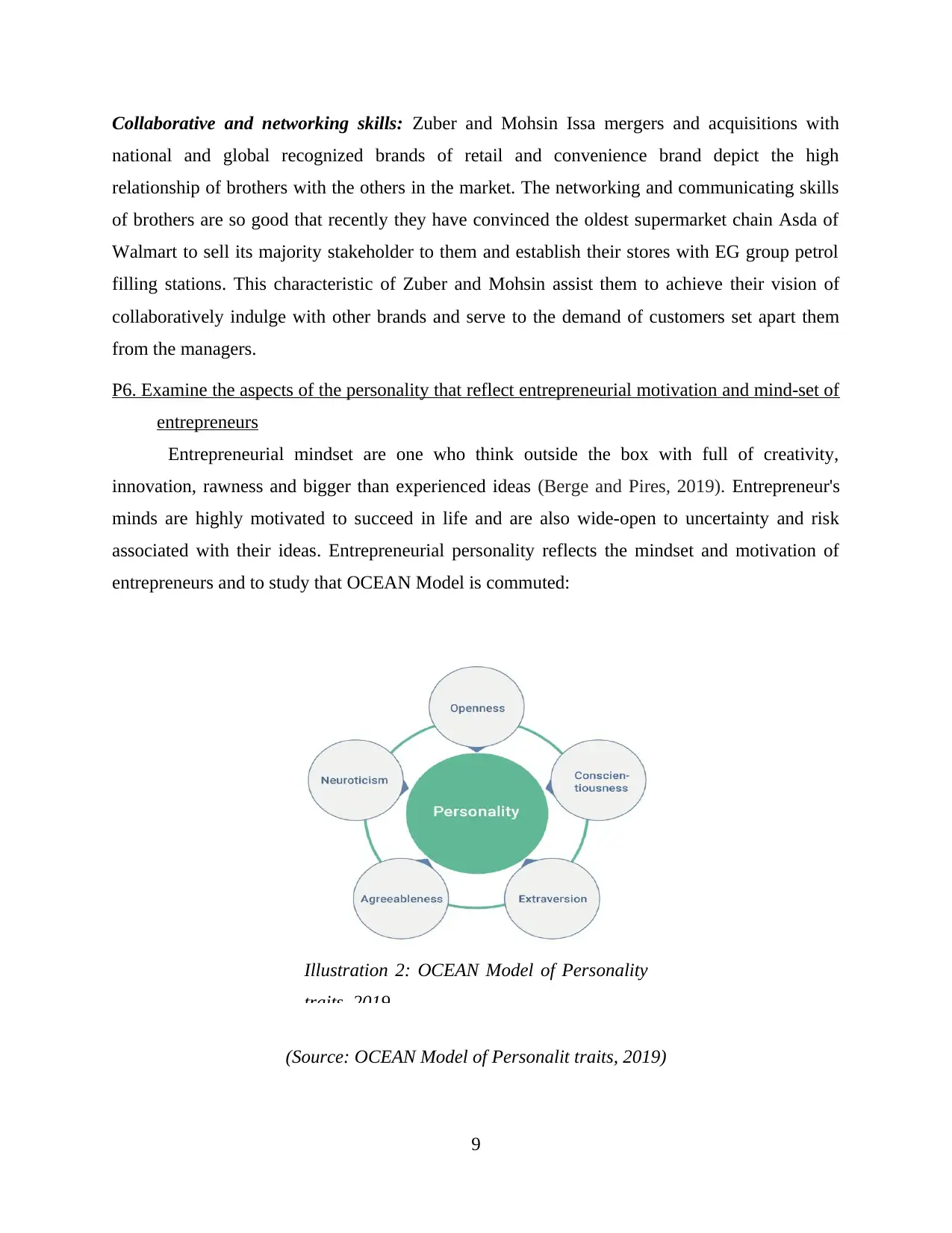
Collaborative and networking skills: Zuber and Mohsin Issa mergers and acquisitions with
national and global recognized brands of retail and convenience brand depict the high
relationship of brothers with the others in the market. The networking and communicating skills
of brothers are so good that recently they have convinced the oldest supermarket chain Asda of
Walmart to sell its majority stakeholder to them and establish their stores with EG group petrol
filling stations. This characteristic of Zuber and Mohsin assist them to achieve their vision of
collaboratively indulge with other brands and serve to the demand of customers set apart them
from the managers.
P6. Examine the aspects of the personality that reflect entrepreneurial motivation and mind-set of
entrepreneurs
Entrepreneurial mindset are one who think outside the box with full of creativity,
innovation, rawness and bigger than experienced ideas (Berge and Pires, 2019). Entrepreneur's
minds are highly motivated to succeed in life and are also wide-open to uncertainty and risk
associated with their ideas. Entrepreneurial personality reflects the mindset and motivation of
entrepreneurs and to study that OCEAN Model is commuted:
(Source: OCEAN Model of Personalit traits, 2019)
9
Illustration 2: OCEAN Model of Personality
traits, 2019
national and global recognized brands of retail and convenience brand depict the high
relationship of brothers with the others in the market. The networking and communicating skills
of brothers are so good that recently they have convinced the oldest supermarket chain Asda of
Walmart to sell its majority stakeholder to them and establish their stores with EG group petrol
filling stations. This characteristic of Zuber and Mohsin assist them to achieve their vision of
collaboratively indulge with other brands and serve to the demand of customers set apart them
from the managers.
P6. Examine the aspects of the personality that reflect entrepreneurial motivation and mind-set of
entrepreneurs
Entrepreneurial mindset are one who think outside the box with full of creativity,
innovation, rawness and bigger than experienced ideas (Berge and Pires, 2019). Entrepreneur's
minds are highly motivated to succeed in life and are also wide-open to uncertainty and risk
associated with their ideas. Entrepreneurial personality reflects the mindset and motivation of
entrepreneurs and to study that OCEAN Model is commuted:
(Source: OCEAN Model of Personalit traits, 2019)
9
Illustration 2: OCEAN Model of Personality
traits, 2019
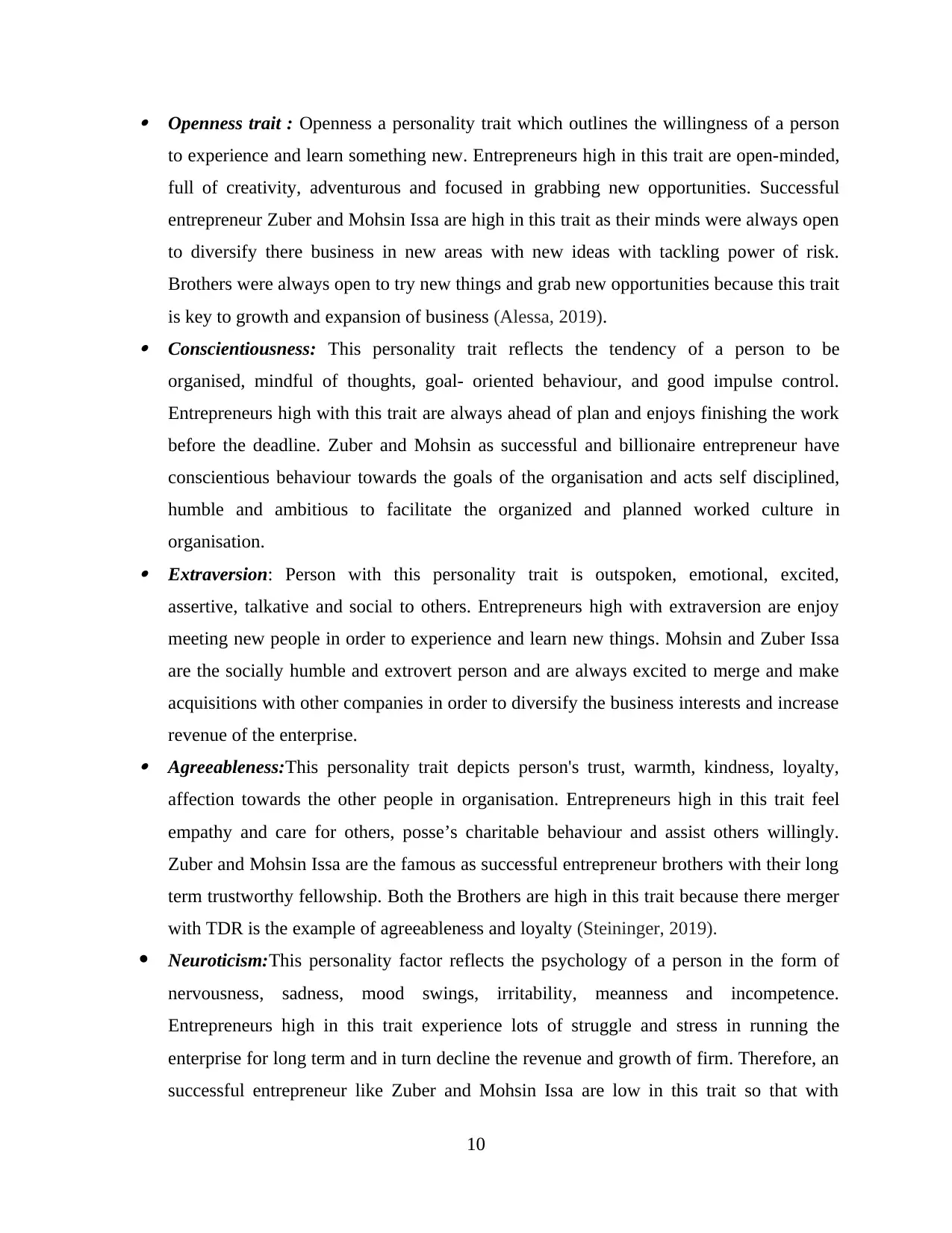
Openness trait : Openness a personality trait which outlines the willingness of a person
to experience and learn something new. Entrepreneurs high in this trait are open-minded,
full of creativity, adventurous and focused in grabbing new opportunities. Successful
entrepreneur Zuber and Mohsin Issa are high in this trait as their minds were always open
to diversify there business in new areas with new ideas with tackling power of risk.
Brothers were always open to try new things and grab new opportunities because this trait
is key to growth and expansion of business (Alessa, 2019). Conscientiousness: This personality trait reflects the tendency of a person to be
organised, mindful of thoughts, goal- oriented behaviour, and good impulse control.
Entrepreneurs high with this trait are always ahead of plan and enjoys finishing the work
before the deadline. Zuber and Mohsin as successful and billionaire entrepreneur have
conscientious behaviour towards the goals of the organisation and acts self disciplined,
humble and ambitious to facilitate the organized and planned worked culture in
organisation. Extraversion: Person with this personality trait is outspoken, emotional, excited,
assertive, talkative and social to others. Entrepreneurs high with extraversion are enjoy
meeting new people in order to experience and learn new things. Mohsin and Zuber Issa
are the socially humble and extrovert person and are always excited to merge and make
acquisitions with other companies in order to diversify the business interests and increase
revenue of the enterprise. Agreeableness:This personality trait depicts person's trust, warmth, kindness, loyalty,
affection towards the other people in organisation. Entrepreneurs high in this trait feel
empathy and care for others, posse’s charitable behaviour and assist others willingly.
Zuber and Mohsin Issa are the famous as successful entrepreneur brothers with their long
term trustworthy fellowship. Both the Brothers are high in this trait because there merger
with TDR is the example of agreeableness and loyalty (Steininger, 2019).
Neuroticism:This personality factor reflects the psychology of a person in the form of
nervousness, sadness, mood swings, irritability, meanness and incompetence.
Entrepreneurs high in this trait experience lots of struggle and stress in running the
enterprise for long term and in turn decline the revenue and growth of firm. Therefore, an
successful entrepreneur like Zuber and Mohsin Issa are low in this trait so that with
10
to experience and learn something new. Entrepreneurs high in this trait are open-minded,
full of creativity, adventurous and focused in grabbing new opportunities. Successful
entrepreneur Zuber and Mohsin Issa are high in this trait as their minds were always open
to diversify there business in new areas with new ideas with tackling power of risk.
Brothers were always open to try new things and grab new opportunities because this trait
is key to growth and expansion of business (Alessa, 2019). Conscientiousness: This personality trait reflects the tendency of a person to be
organised, mindful of thoughts, goal- oriented behaviour, and good impulse control.
Entrepreneurs high with this trait are always ahead of plan and enjoys finishing the work
before the deadline. Zuber and Mohsin as successful and billionaire entrepreneur have
conscientious behaviour towards the goals of the organisation and acts self disciplined,
humble and ambitious to facilitate the organized and planned worked culture in
organisation. Extraversion: Person with this personality trait is outspoken, emotional, excited,
assertive, talkative and social to others. Entrepreneurs high with extraversion are enjoy
meeting new people in order to experience and learn new things. Mohsin and Zuber Issa
are the socially humble and extrovert person and are always excited to merge and make
acquisitions with other companies in order to diversify the business interests and increase
revenue of the enterprise. Agreeableness:This personality trait depicts person's trust, warmth, kindness, loyalty,
affection towards the other people in organisation. Entrepreneurs high in this trait feel
empathy and care for others, posse’s charitable behaviour and assist others willingly.
Zuber and Mohsin Issa are the famous as successful entrepreneur brothers with their long
term trustworthy fellowship. Both the Brothers are high in this trait because there merger
with TDR is the example of agreeableness and loyalty (Steininger, 2019).
Neuroticism:This personality factor reflects the psychology of a person in the form of
nervousness, sadness, mood swings, irritability, meanness and incompetence.
Entrepreneurs high in this trait experience lots of struggle and stress in running the
enterprise for long term and in turn decline the revenue and growth of firm. Therefore, an
successful entrepreneur like Zuber and Mohsin Issa are low in this trait so that with
10
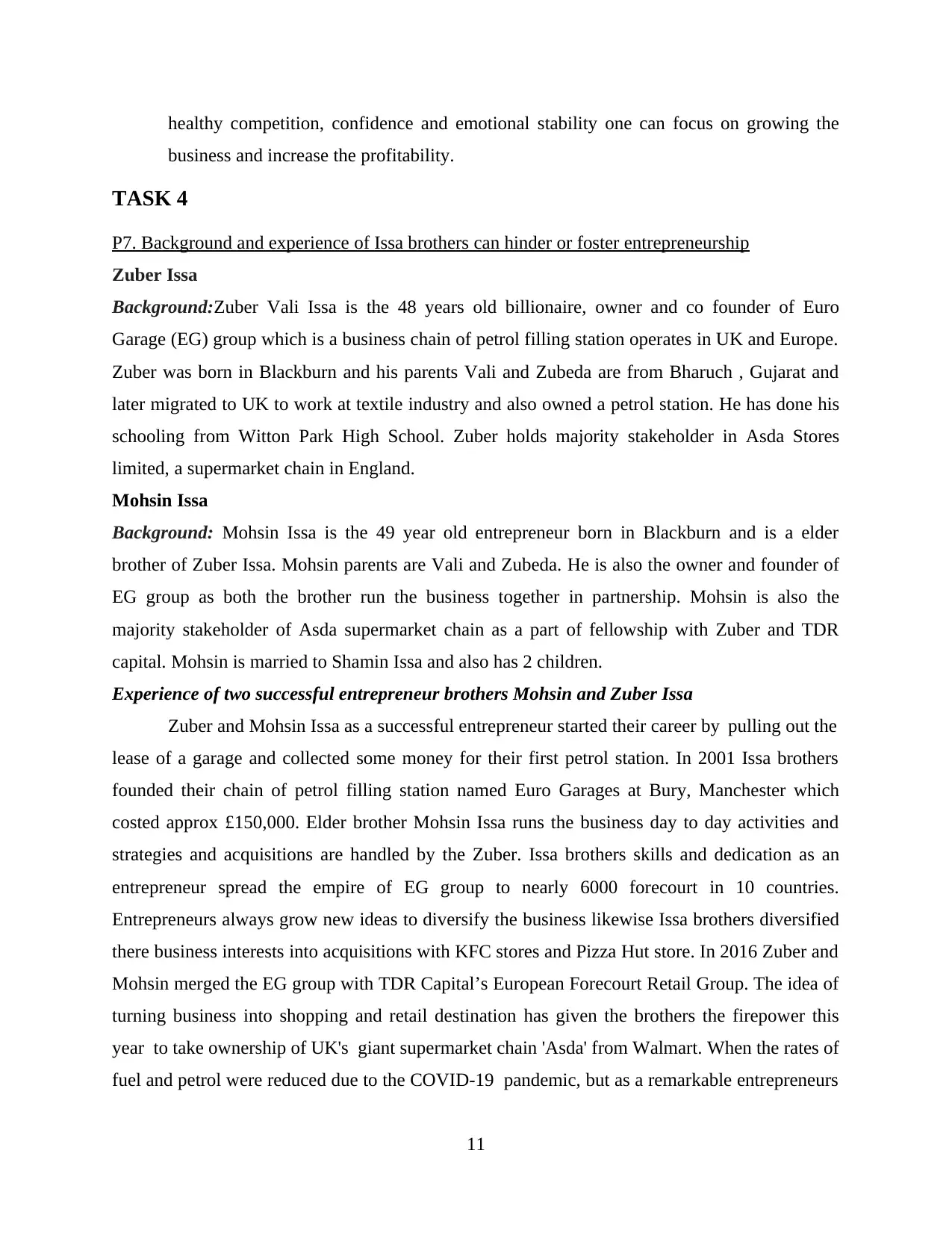
healthy competition, confidence and emotional stability one can focus on growing the
business and increase the profitability.
TASK 4
P7. Background and experience of Issa brothers can hinder or foster entrepreneurship
Zuber Issa
Background:Zuber Vali Issa is the 48 years old billionaire, owner and co founder of Euro
Garage (EG) group which is a business chain of petrol filling station operates in UK and Europe.
Zuber was born in Blackburn and his parents Vali and Zubeda are from Bharuch , Gujarat and
later migrated to UK to work at textile industry and also owned a petrol station. He has done his
schooling from Witton Park High School. Zuber holds majority stakeholder in Asda Stores
limited, a supermarket chain in England.
Mohsin Issa
Background: Mohsin Issa is the 49 year old entrepreneur born in Blackburn and is a elder
brother of Zuber Issa. Mohsin parents are Vali and Zubeda. He is also the owner and founder of
EG group as both the brother run the business together in partnership. Mohsin is also the
majority stakeholder of Asda supermarket chain as a part of fellowship with Zuber and TDR
capital. Mohsin is married to Shamin Issa and also has 2 children.
Experience of two successful entrepreneur brothers Mohsin and Zuber Issa
Zuber and Mohsin Issa as a successful entrepreneur started their career by pulling out the
lease of a garage and collected some money for their first petrol station. In 2001 Issa brothers
founded their chain of petrol filling station named Euro Garages at Bury, Manchester which
costed approx £150,000. Elder brother Mohsin Issa runs the business day to day activities and
strategies and acquisitions are handled by the Zuber. Issa brothers skills and dedication as an
entrepreneur spread the empire of EG group to nearly 6000 forecourt in 10 countries.
Entrepreneurs always grow new ideas to diversify the business likewise Issa brothers diversified
there business interests into acquisitions with KFC stores and Pizza Hut store. In 2016 Zuber and
Mohsin merged the EG group with TDR Capital’s European Forecourt Retail Group. The idea of
turning business into shopping and retail destination has given the brothers the firepower this
year to take ownership of UK's giant supermarket chain 'Asda' from Walmart. When the rates of
fuel and petrol were reduced due to the COVID-19 pandemic, but as a remarkable entrepreneurs
11
business and increase the profitability.
TASK 4
P7. Background and experience of Issa brothers can hinder or foster entrepreneurship
Zuber Issa
Background:Zuber Vali Issa is the 48 years old billionaire, owner and co founder of Euro
Garage (EG) group which is a business chain of petrol filling station operates in UK and Europe.
Zuber was born in Blackburn and his parents Vali and Zubeda are from Bharuch , Gujarat and
later migrated to UK to work at textile industry and also owned a petrol station. He has done his
schooling from Witton Park High School. Zuber holds majority stakeholder in Asda Stores
limited, a supermarket chain in England.
Mohsin Issa
Background: Mohsin Issa is the 49 year old entrepreneur born in Blackburn and is a elder
brother of Zuber Issa. Mohsin parents are Vali and Zubeda. He is also the owner and founder of
EG group as both the brother run the business together in partnership. Mohsin is also the
majority stakeholder of Asda supermarket chain as a part of fellowship with Zuber and TDR
capital. Mohsin is married to Shamin Issa and also has 2 children.
Experience of two successful entrepreneur brothers Mohsin and Zuber Issa
Zuber and Mohsin Issa as a successful entrepreneur started their career by pulling out the
lease of a garage and collected some money for their first petrol station. In 2001 Issa brothers
founded their chain of petrol filling station named Euro Garages at Bury, Manchester which
costed approx £150,000. Elder brother Mohsin Issa runs the business day to day activities and
strategies and acquisitions are handled by the Zuber. Issa brothers skills and dedication as an
entrepreneur spread the empire of EG group to nearly 6000 forecourt in 10 countries.
Entrepreneurs always grow new ideas to diversify the business likewise Issa brothers diversified
there business interests into acquisitions with KFC stores and Pizza Hut store. In 2016 Zuber and
Mohsin merged the EG group with TDR Capital’s European Forecourt Retail Group. The idea of
turning business into shopping and retail destination has given the brothers the firepower this
year to take ownership of UK's giant supermarket chain 'Asda' from Walmart. When the rates of
fuel and petrol were reduced due to the COVID-19 pandemic, but as a remarkable entrepreneurs
11
Paraphrase This Document
Need a fresh take? Get an instant paraphrase of this document with our AI Paraphraser
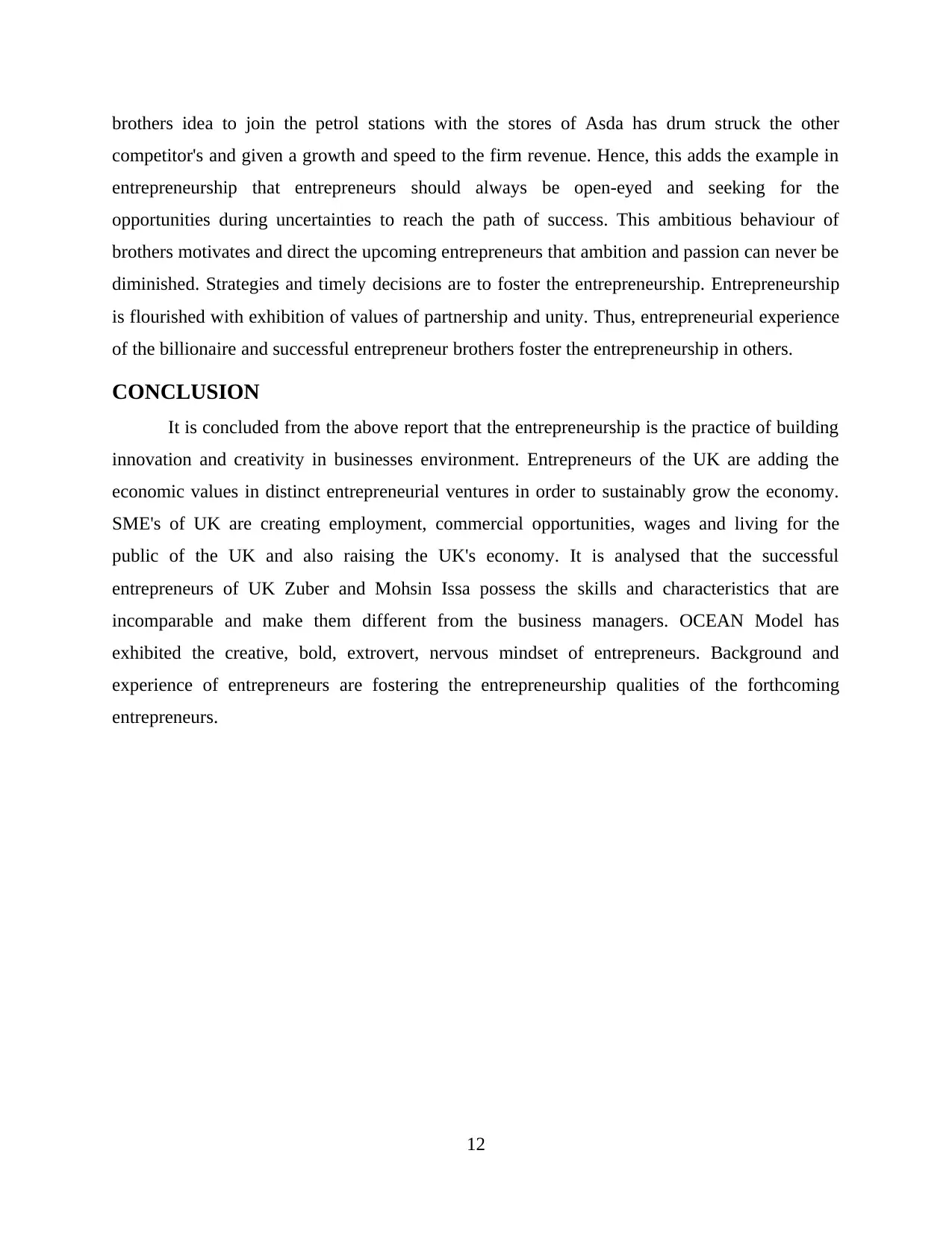
brothers idea to join the petrol stations with the stores of Asda has drum struck the other
competitor's and given a growth and speed to the firm revenue. Hence, this adds the example in
entrepreneurship that entrepreneurs should always be open-eyed and seeking for the
opportunities during uncertainties to reach the path of success. This ambitious behaviour of
brothers motivates and direct the upcoming entrepreneurs that ambition and passion can never be
diminished. Strategies and timely decisions are to foster the entrepreneurship. Entrepreneurship
is flourished with exhibition of values of partnership and unity. Thus, entrepreneurial experience
of the billionaire and successful entrepreneur brothers foster the entrepreneurship in others.
CONCLUSION
It is concluded from the above report that the entrepreneurship is the practice of building
innovation and creativity in businesses environment. Entrepreneurs of the UK are adding the
economic values in distinct entrepreneurial ventures in order to sustainably grow the economy.
SME's of UK are creating employment, commercial opportunities, wages and living for the
public of the UK and also raising the UK's economy. It is analysed that the successful
entrepreneurs of UK Zuber and Mohsin Issa possess the skills and characteristics that are
incomparable and make them different from the business managers. OCEAN Model has
exhibited the creative, bold, extrovert, nervous mindset of entrepreneurs. Background and
experience of entrepreneurs are fostering the entrepreneurship qualities of the forthcoming
entrepreneurs.
12
competitor's and given a growth and speed to the firm revenue. Hence, this adds the example in
entrepreneurship that entrepreneurs should always be open-eyed and seeking for the
opportunities during uncertainties to reach the path of success. This ambitious behaviour of
brothers motivates and direct the upcoming entrepreneurs that ambition and passion can never be
diminished. Strategies and timely decisions are to foster the entrepreneurship. Entrepreneurship
is flourished with exhibition of values of partnership and unity. Thus, entrepreneurial experience
of the billionaire and successful entrepreneur brothers foster the entrepreneurship in others.
CONCLUSION
It is concluded from the above report that the entrepreneurship is the practice of building
innovation and creativity in businesses environment. Entrepreneurs of the UK are adding the
economic values in distinct entrepreneurial ventures in order to sustainably grow the economy.
SME's of UK are creating employment, commercial opportunities, wages and living for the
public of the UK and also raising the UK's economy. It is analysed that the successful
entrepreneurs of UK Zuber and Mohsin Issa possess the skills and characteristics that are
incomparable and make them different from the business managers. OCEAN Model has
exhibited the creative, bold, extrovert, nervous mindset of entrepreneurs. Background and
experience of entrepreneurs are fostering the entrepreneurship qualities of the forthcoming
entrepreneurs.
12
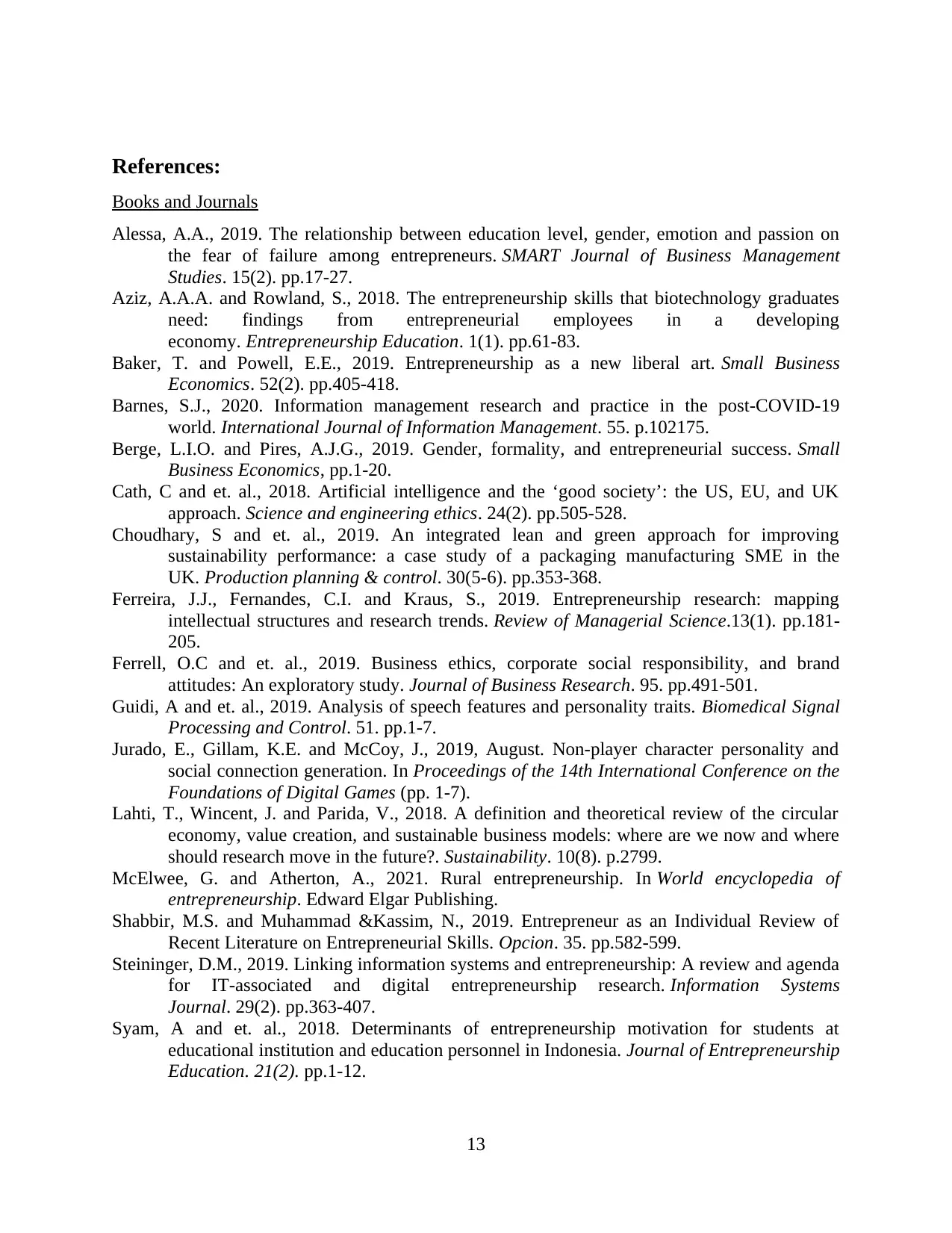
References:
Books and Journals
Alessa, A.A., 2019. The relationship between education level, gender, emotion and passion on
the fear of failure among entrepreneurs. SMART Journal of Business Management
Studies. 15(2). pp.17-27.
Aziz, A.A.A. and Rowland, S., 2018. The entrepreneurship skills that biotechnology graduates
need: findings from entrepreneurial employees in a developing
economy. Entrepreneurship Education. 1(1). pp.61-83.
Baker, T. and Powell, E.E., 2019. Entrepreneurship as a new liberal art. Small Business
Economics. 52(2). pp.405-418.
Barnes, S.J., 2020. Information management research and practice in the post-COVID-19
world. International Journal of Information Management. 55. p.102175.
Berge, L.I.O. and Pires, A.J.G., 2019. Gender, formality, and entrepreneurial success. Small
Business Economics, pp.1-20.
Cath, C and et. al., 2018. Artificial intelligence and the ‘good society’: the US, EU, and UK
approach. Science and engineering ethics. 24(2). pp.505-528.
Choudhary, S and et. al., 2019. An integrated lean and green approach for improving
sustainability performance: a case study of a packaging manufacturing SME in the
UK. Production planning & control. 30(5-6). pp.353-368.
Ferreira, J.J., Fernandes, C.I. and Kraus, S., 2019. Entrepreneurship research: mapping
intellectual structures and research trends. Review of Managerial Science.13(1). pp.181-
205.
Ferrell, O.C and et. al., 2019. Business ethics, corporate social responsibility, and brand
attitudes: An exploratory study. Journal of Business Research. 95. pp.491-501.
Guidi, A and et. al., 2019. Analysis of speech features and personality traits. Biomedical Signal
Processing and Control. 51. pp.1-7.
Jurado, E., Gillam, K.E. and McCoy, J., 2019, August. Non-player character personality and
social connection generation. In Proceedings of the 14th International Conference on the
Foundations of Digital Games (pp. 1-7).
Lahti, T., Wincent, J. and Parida, V., 2018. A definition and theoretical review of the circular
economy, value creation, and sustainable business models: where are we now and where
should research move in the future?. Sustainability. 10(8). p.2799.
McElwee, G. and Atherton, A., 2021. Rural entrepreneurship. In World encyclopedia of
entrepreneurship. Edward Elgar Publishing.
Shabbir, M.S. and Muhammad &Kassim, N., 2019. Entrepreneur as an Individual Review of
Recent Literature on Entrepreneurial Skills. Opcion. 35. pp.582-599.
Steininger, D.M., 2019. Linking information systems and entrepreneurship: A review and agenda
for IT‐associated and digital entrepreneurship research. Information Systems
Journal. 29(2). pp.363-407.
Syam, A and et. al., 2018. Determinants of entrepreneurship motivation for students at
educational institution and education personnel in Indonesia. Journal of Entrepreneurship
Education. 21(2). pp.1-12.
13
Books and Journals
Alessa, A.A., 2019. The relationship between education level, gender, emotion and passion on
the fear of failure among entrepreneurs. SMART Journal of Business Management
Studies. 15(2). pp.17-27.
Aziz, A.A.A. and Rowland, S., 2018. The entrepreneurship skills that biotechnology graduates
need: findings from entrepreneurial employees in a developing
economy. Entrepreneurship Education. 1(1). pp.61-83.
Baker, T. and Powell, E.E., 2019. Entrepreneurship as a new liberal art. Small Business
Economics. 52(2). pp.405-418.
Barnes, S.J., 2020. Information management research and practice in the post-COVID-19
world. International Journal of Information Management. 55. p.102175.
Berge, L.I.O. and Pires, A.J.G., 2019. Gender, formality, and entrepreneurial success. Small
Business Economics, pp.1-20.
Cath, C and et. al., 2018. Artificial intelligence and the ‘good society’: the US, EU, and UK
approach. Science and engineering ethics. 24(2). pp.505-528.
Choudhary, S and et. al., 2019. An integrated lean and green approach for improving
sustainability performance: a case study of a packaging manufacturing SME in the
UK. Production planning & control. 30(5-6). pp.353-368.
Ferreira, J.J., Fernandes, C.I. and Kraus, S., 2019. Entrepreneurship research: mapping
intellectual structures and research trends. Review of Managerial Science.13(1). pp.181-
205.
Ferrell, O.C and et. al., 2019. Business ethics, corporate social responsibility, and brand
attitudes: An exploratory study. Journal of Business Research. 95. pp.491-501.
Guidi, A and et. al., 2019. Analysis of speech features and personality traits. Biomedical Signal
Processing and Control. 51. pp.1-7.
Jurado, E., Gillam, K.E. and McCoy, J., 2019, August. Non-player character personality and
social connection generation. In Proceedings of the 14th International Conference on the
Foundations of Digital Games (pp. 1-7).
Lahti, T., Wincent, J. and Parida, V., 2018. A definition and theoretical review of the circular
economy, value creation, and sustainable business models: where are we now and where
should research move in the future?. Sustainability. 10(8). p.2799.
McElwee, G. and Atherton, A., 2021. Rural entrepreneurship. In World encyclopedia of
entrepreneurship. Edward Elgar Publishing.
Shabbir, M.S. and Muhammad &Kassim, N., 2019. Entrepreneur as an Individual Review of
Recent Literature on Entrepreneurial Skills. Opcion. 35. pp.582-599.
Steininger, D.M., 2019. Linking information systems and entrepreneurship: A review and agenda
for IT‐associated and digital entrepreneurship research. Information Systems
Journal. 29(2). pp.363-407.
Syam, A and et. al., 2018. Determinants of entrepreneurship motivation for students at
educational institution and education personnel in Indonesia. Journal of Entrepreneurship
Education. 21(2). pp.1-12.
13

Vanevenhoven, C. and Vanevenhoven, J., 2021. The art of teaching arts entrepreneurship.
In Annals of Entrepreneurship Education and Pedagogy–2021. Edward Elgar Publishing.
Yang, X., Liao, S. and Li, R., 2021. The evolution of new ventures’ behavioral strategies and the
role played by governments in the green entrepreneurship context: an evolutionary game
theory perspective. Environmental Science and Pollution Research, pp.1-18.
14
In Annals of Entrepreneurship Education and Pedagogy–2021. Edward Elgar Publishing.
Yang, X., Liao, S. and Li, R., 2021. The evolution of new ventures’ behavioral strategies and the
role played by governments in the green entrepreneurship context: an evolutionary game
theory perspective. Environmental Science and Pollution Research, pp.1-18.
14
1 out of 16
Related Documents
Your All-in-One AI-Powered Toolkit for Academic Success.
+13062052269
info@desklib.com
Available 24*7 on WhatsApp / Email
![[object Object]](/_next/static/media/star-bottom.7253800d.svg)
Unlock your academic potential
© 2024 | Zucol Services PVT LTD | All rights reserved.





